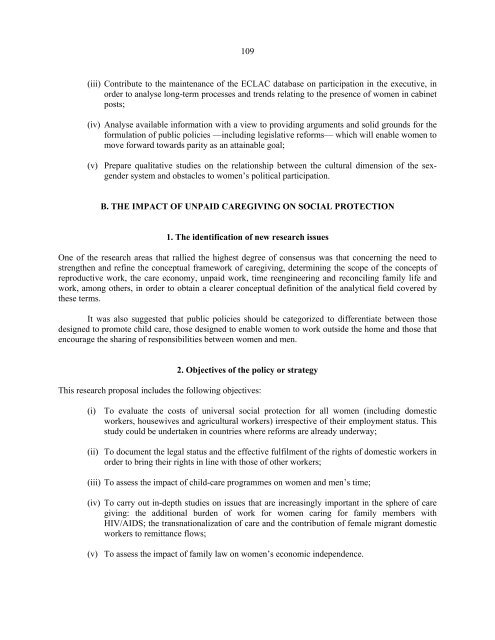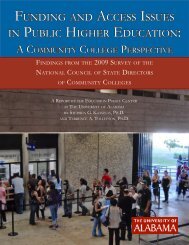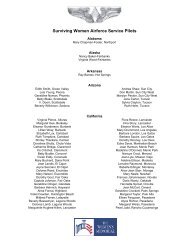Women in Latin America and the Caribbean - Cepal
Women in Latin America and the Caribbean - Cepal
Women in Latin America and the Caribbean - Cepal
Create successful ePaper yourself
Turn your PDF publications into a flip-book with our unique Google optimized e-Paper software.
109<br />
(iii) Contribute to <strong>the</strong> ma<strong>in</strong>tenance of <strong>the</strong> ECLAC database on participation <strong>in</strong> <strong>the</strong> executive, <strong>in</strong><br />
order to analyse long-term processes <strong>and</strong> trends relat<strong>in</strong>g to <strong>the</strong> presence of women <strong>in</strong> cab<strong>in</strong>et<br />
posts;<br />
(iv) Analyse available <strong>in</strong>formation with a view to provid<strong>in</strong>g arguments <strong>and</strong> solid grounds for <strong>the</strong><br />
formulation of public policies —<strong>in</strong>clud<strong>in</strong>g legislative reforms— which will enable women to<br />
move forward towards parity as an atta<strong>in</strong>able goal;<br />
(v) Prepare qualitative studies on <strong>the</strong> relationship between <strong>the</strong> cultural dimension of <strong>the</strong> sexgender<br />
system <strong>and</strong> obstacles to women’s political participation.<br />
B. THE IMPACT OF UNPAID CAREGIVING ON SOCIAL PROTECTION<br />
1. The identification of new research issues<br />
One of <strong>the</strong> research areas that rallied <strong>the</strong> highest degree of consensus was that concern<strong>in</strong>g <strong>the</strong> need to<br />
streng<strong>the</strong>n <strong>and</strong> ref<strong>in</strong>e <strong>the</strong> conceptual framework of caregiv<strong>in</strong>g, determ<strong>in</strong><strong>in</strong>g <strong>the</strong> scope of <strong>the</strong> concepts of<br />
reproductive work, <strong>the</strong> care economy, unpaid work, time reeng<strong>in</strong>eer<strong>in</strong>g <strong>and</strong> reconcil<strong>in</strong>g family life <strong>and</strong><br />
work, among o<strong>the</strong>rs, <strong>in</strong> order to obta<strong>in</strong> a clearer conceptual def<strong>in</strong>ition of <strong>the</strong> analytical field covered by<br />
<strong>the</strong>se terms.<br />
It was also suggested that public policies should be categorized to differentiate between those<br />
designed to promote child care, those designed to enable women to work outside <strong>the</strong> home <strong>and</strong> those that<br />
encourage <strong>the</strong> shar<strong>in</strong>g of responsibilities between women <strong>and</strong> men.<br />
2. Objectives of <strong>the</strong> policy or strategy<br />
This research proposal <strong>in</strong>cludes <strong>the</strong> follow<strong>in</strong>g objectives:<br />
(i) To evaluate <strong>the</strong> costs of universal social protection for all women (<strong>in</strong>clud<strong>in</strong>g domestic<br />
workers, housewives <strong>and</strong> agricultural workers) irrespective of <strong>the</strong>ir employment status. This<br />
study could be undertaken <strong>in</strong> countries where reforms are already underway;<br />
(ii) To document <strong>the</strong> legal status <strong>and</strong> <strong>the</strong> effective fulfilment of <strong>the</strong> rights of domestic workers <strong>in</strong><br />
order to br<strong>in</strong>g <strong>the</strong>ir rights <strong>in</strong> l<strong>in</strong>e with those of o<strong>the</strong>r workers;<br />
(iii) To assess <strong>the</strong> impact of child-care programmes on women <strong>and</strong> men’s time;<br />
(iv) To carry out <strong>in</strong>-depth studies on issues that are <strong>in</strong>creas<strong>in</strong>gly important <strong>in</strong> <strong>the</strong> sphere of care<br />
giv<strong>in</strong>g: <strong>the</strong> additional burden of work for women car<strong>in</strong>g for family members with<br />
HIV/AIDS; <strong>the</strong> transnationalization of care <strong>and</strong> <strong>the</strong> contribution of female migrant domestic<br />
workers to remittance flows;<br />
(v) To assess <strong>the</strong> impact of family law on women’s economic <strong>in</strong>dependence.











